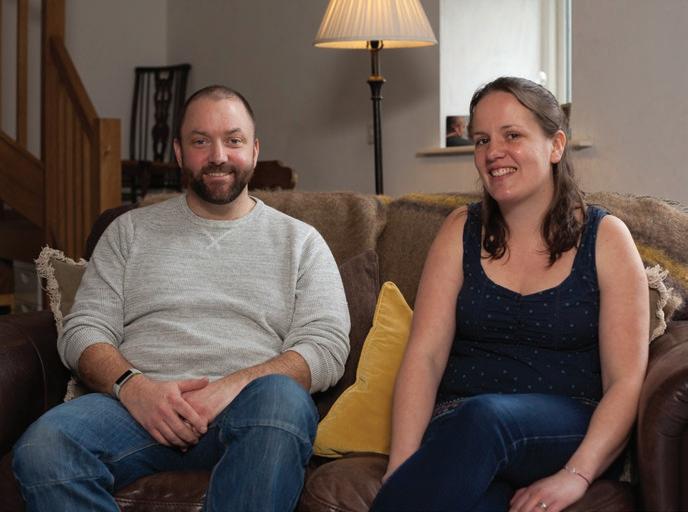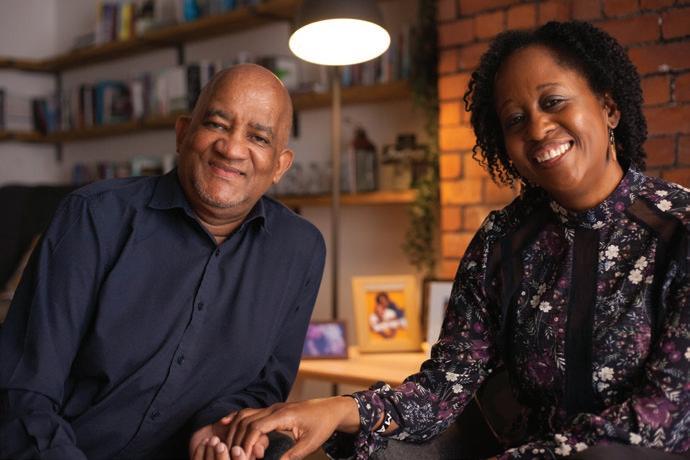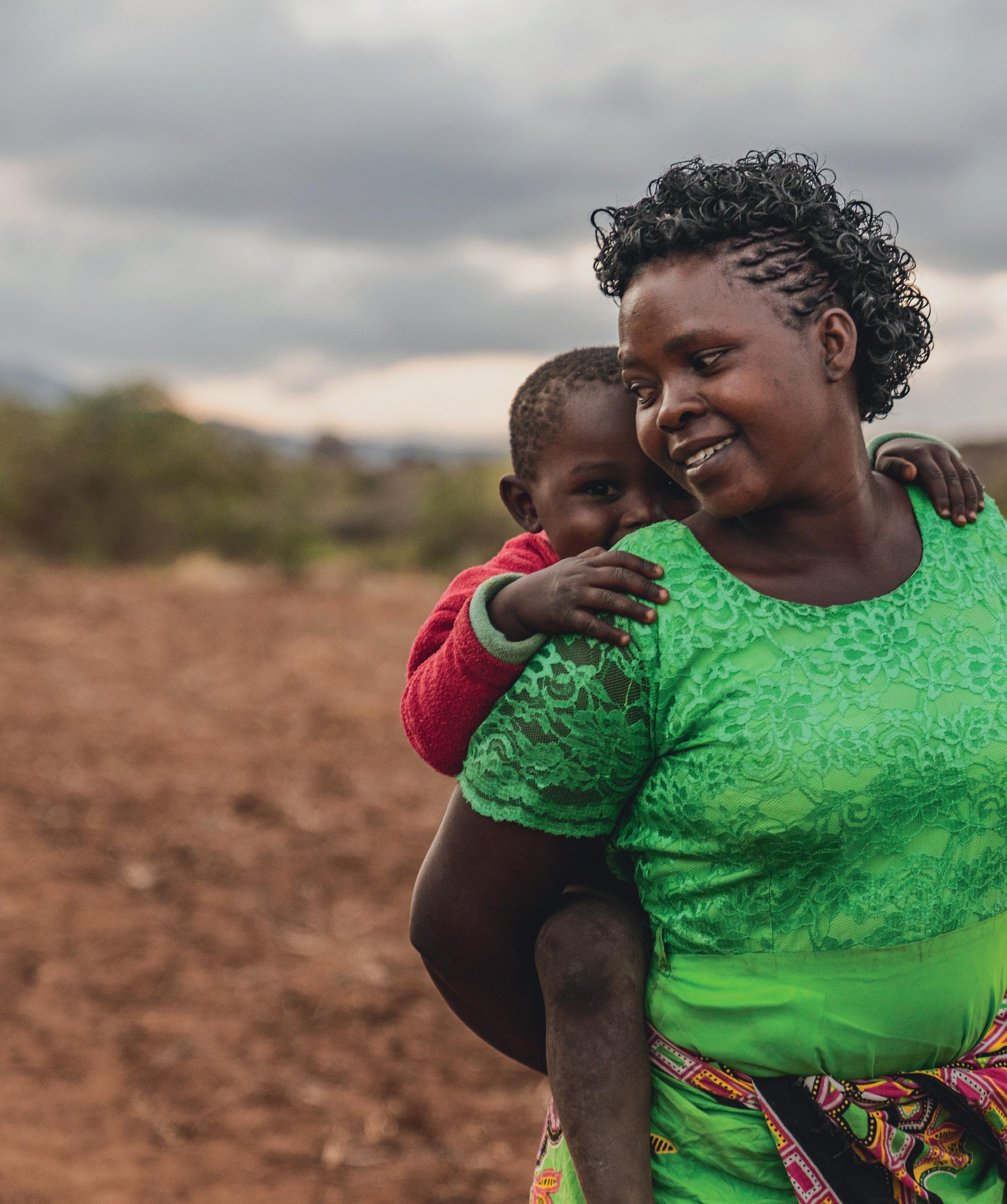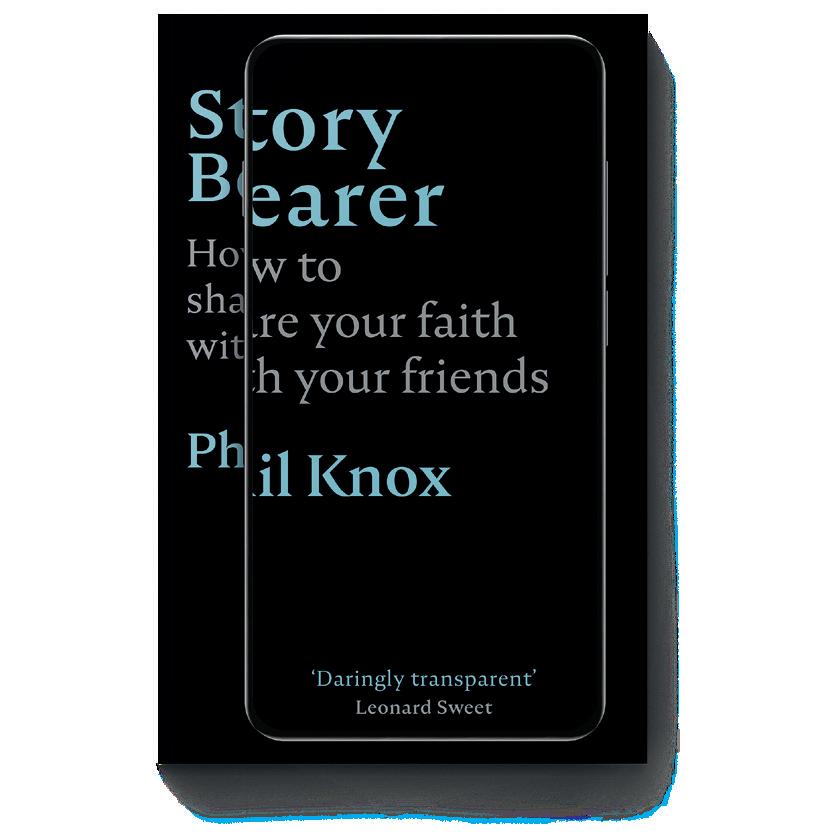
10 minute read
Living the freedom life
life LIVING THE
FREEDOM
How might our freedom in Christ lead to radical service to others, even amid the challenges? asks Fred Drummond, director of Evangelical Alliance Scotland.
Isometimes picture an opening scene of an action movie. Perhaps something like Robin Hood. The protagonist is trapped, chained in a dungeon. He is in pitch darkness. Someone manages to break into the prison, snap the chains and carry the man out of the prison into the blinding light of day.
The chains are broken. The darkness, which has held him for so long, no longer has a hold and is replaced by warmth and brightness. This is how I picture the freedom found in Jesus, to be rescued from the kingdom of darkness and carried into the kingdom of God.
The apostle Paul writes to the Colossians: “For He has rescued us from the dominion of darkness and brought us into the kingdom of the Son He loves, in whom we have redemption, the forgiveness of sins” (1:13-14). In Jesus, through His death,
resurrection and ascension, I have been set free from the chains of sin, from the darkness of hopelessness, from the despair of living an empty life, separated from God.
This freedom is found in Jesus alone. When the Son sets us free, we are free indeed. We are then called to live in the freedom of the Spirit. Paul tells the church in Corinth: “The Lord is Spirit, and where the Spirit of the Lord is, there is freedom” (2 Corinthians 3:17). Our freedom in Christ affects every part of our lives and allows us to live radically different lives. We live in a new power with a new identity. As the liberated children of God, we can now approach the Father with freedom and confidence, living in communion with Him, seeking to honour Him and see His kingdom come.
But, what does living radically in the freedom we have in Christ look like, particularly in an ever-secularising society? The paradox of our freedom in Jesus is that we give it away in His service. We don’t live for ourselves or to the values or reputation of the world; we live in humble, radical service to others. In the grace and love of God we seek to live to a different culture. I believe it is impossible for us as Christians to read chapters five to seven of the gospel
of Matthew and not sense that we have been called to a life of radical service and love which will put us at odds with much of what happens around us. It is not that we are trying to change the culture around us; it is that we are now living to the values and culture of the King.
This is primarily, though not exclusively, shown in our commitment to the poor, broken and marginalised, trapped, lonely, hopeless and abandoned. We are to be channels through which Jesus shows His mercy and care – channels that lead to transformation and hope in others. Freedom is the cry of men, women and children across the world, and we who have found the one who is freedom can both show and point others to Him.
I am a proud Scot, and as I look at statistics around drug-related deaths and suicides, I’m deeply saddened. In 2018 more
than 1,100 people in Scotland died of drug misuse – a 27 per cent increase on 2017. Scotland has more drug-related deaths per capita than any other country in Europe. In 2019 The Times reported that the number of suicides in the nation had risen to the highest level for five years. Deaths of people aged 15-24 years old are up 50 per cent. Numbers of those self-harming have also increased.
The reasons behind these staggering figures are complex, each situation is unique, and the loss of every life is a tragedy. However, I do believe that many were searching for both hope and freedom. We, the people who have freedom, can live in ways that make freedom a possibility for others.
I have the privilege of seeing faith communities and individual Christians, through their love, point others to the way of freedom. From homeless shelters to advocacy for those who have no power. From dementia groups to those who are walking with the addicted. In almost every part of the UK there are Christians serving, sharing, loving and praying for others to experience Jesus, who alone brings freedom.
Can I ask you, what are the biggest needs in your community? Could you and your church be doing more? Does your freedom in Christ cost you something? Could you bless the stranger, care for the leper, and hold the hand of the confused and broken?
Perhaps you could engage with communities in fun and creative ways. In response to social distancing measures implemented by government amid the coronavirus pandemic, Christian individuals and churches have begun to explore new ways of connecting with those around them. In communities, neighbours are rallying around one another (read Ann Clifford’s article on page 10), and on a larger scale, churches across the UK are responding to the emerging needs around us, to serve those who are vulnerable and at risk. I’m sure that you have, and can come up with, more ideas; the objective is to do something that demonstrates the love, joy, peace and hope found in Jesus.
But, might we sometimes be tempted to be a risk-averse community? Do we want to hide away, say nothing, and do little that marks us out as people who live to different values, putting Christ first, others next and ourselves much further down the line?
As our faith becomes more marginalised, we may become increasingly uncomfortable in the contested spaces in which we live. Where we find it harder to explain our faith, the temptation may be to shrink away, say little, pull up the drawbridge. This would be a crucial mistake, for this is a time for creative engagement and lavish, unexplainable love. To retreat is to deny our freedom and become chained once again to what society thinks of us.
It is time for bold proclamation and sacrificial demonstration of what Jesus has done, is doing and will do. We need to spark transformative hope by going further than ever before, surprising ourselves with the clarity of our witness and the beauty of redemptive love and forgiveness.
Our nations need us to share the good news of the freedom found in Christ. This is the time for big prayers and jaw-dropping action. We have the space in our nations to proclaim the gospel and live in ways that demonstrate our Christian values. We can be thankful to God for all the freedom we have in society to demonstrate the works of His kingdom, however, that might not always be the case.
As God’s good news is increasingly misunderstood or treated with suspicion, and we find our worldview marginalised, we’d do well to take the opportunities we have while we have them. In Scotland we are dealing with issues around no-platforming – councils determining who should speak in their venues. Some churches that use community buildings are as a result nervous about bookings being pulled.
Our status in UK society may be changing a little, but we were never called to win a popularity contest – we were called to be salt and light, pointing to the one who breaks chains and sets people free.
Have you ever considered your relationship with money? It might sound like an odd question, but we do have an emotional connection to money because it means something to us.
That’s probably why money is the number one trigger of arguments between partners, according to a 2017 YouGov survey, and the conflicts are intense, less easily resolved and endure for longer than many others.
For Tim and Jacqui money was always tight growing up and, for most of their married life, money was a huge source of tension and arguments. Having children squeezed finances further and added to the conflict. Peter and Eilidh married in October 2018. They had very different priorities on what they wanted to spend on their wedding, and there were many tense and upsetting conversations. Matt and Jennie had to deal with an enormous debt early in their marriage, which put them under financial pressure for many years. It also left them feeling very isolated.
Like many of our attitudes and behaviours, we develop them growing up. Nick and Ruth came into marriage with very different backgrounds; Ruth’s parents instilled strict discipline around money, whereas Nick’s mum was a single working mother who subsidised her income with store cards. Nick borrowed freely whilst single and, when he was married, he realised his debts came to a staggering £22,000.
We’re often not aware of it but the way we handle money is a clue to the state of our hearts. For many people money provides a sense of security and typically they like to save as much as possible. For some, money can mean freedom and independence, and so sticking to a budget can feel like their freedom is being restricted. For others, money means success and status, perhaps resulting in spending more than they can afford to keep up appearances. Of course it’s good to save sensibly and it’s not wrong to enjoy the freedom of spending that a comfortable salary brings.
Jesus puts His finger on our emotional connection: “Where your treasure is, there you heart will be also (Matthew 6:21). He’s very clear where our priorities need to be: “You cannot serve both God and money” (Matthew 6:24b). We know Jesus wants to have first place in our hearts, but sin is in all areas of our lives and often we’re just blind to its subtle hold.
It’s worth understanding our relationship to money because it helps us to understand ourselves, communicate more honestly, and start to make changes where needed, which are important in themselves but especially in a marriage. FamilyLife, part of Agape UK, has teamed up with Christians Against Poverty to produce a free online resource to help couples manage money better.
Paula Stringer, UK CEO for Christians Against Poverty, says, “Talking freely about finances is one of the biggest challenges couples can face so we’ve been delighted to work with FamilyLife on this new Money Module for the Toucan app. The CAP Money Course referenced in the module has helped tens of thousands of people to budget. Our hope is that it will give people the best excuse for talking about their financial priorities rather than leaving it until a crisis point.”
Mark Daniel, director of FamilyLife UK, adds, “The Money Module helps couples explore their habits, attitudes and priorities towards money. It looks at some of the pressure points around communication to find ways of talking more constructively. The module also equips couples with some skills and tools to manage money better.”
MINDSET
MONEY & MARRIAGE, In this moment we’re working with CAP to support married couples that have money issues, says Christine Daniel, director of FamilyLife UK.




The four couples feature in Toucan’s Money Module, vulnerably sharing their stories. Peter and Eilidh talk about how they learned to communicate more openly, managing their strongly held opinions and disagreements better. The couple are still learning to navigate their differences; Eilidh loves new experiences and travelling to visit friends, and would describe herself as a more impulsive spender, whereas Peter prefers to save and is cautious about spending. They recently bought their first home, making many significant financial commitments together.
Instead of letting the problem of their debt divide them, Matt and Jennie learned to adjust, living frugally and making positive parenting decisions within their budget. Nick and Ruth also spent a few years paying off debt and learned to budget and save with common goals. Tim and Jacqui learned a lot about good communication around money and making informed choices for the whole family, especially after Tim retired recently.
To find out more about this free resource, visit toucantogether.com
Love never fails.
Coronavirus impacts all of us.

But love unites us all.
Join us in prayer and action for our neighbours near and far.
Faith Muvili carrying her son Hilary across fields in Kenya.
Support Christian Aid Week 10-16 May caid.org.uk











